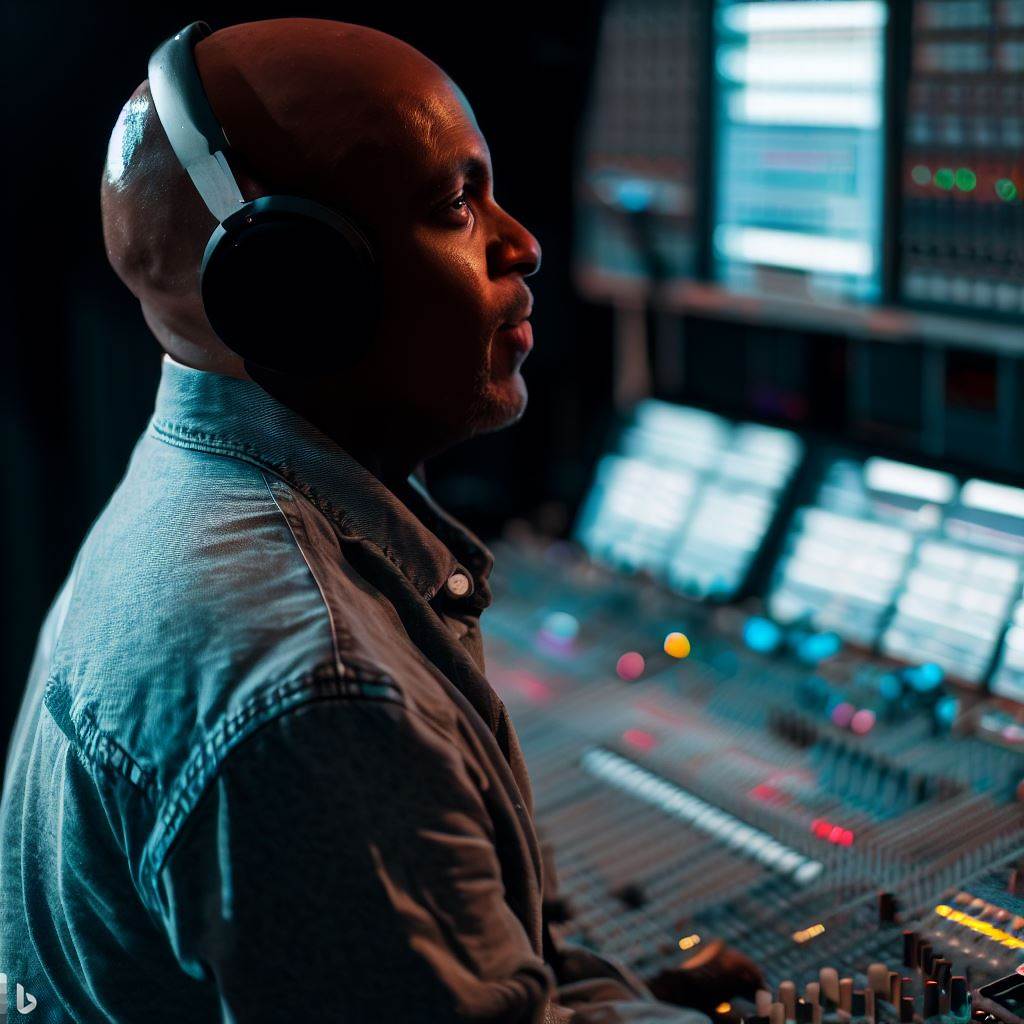Introduction
A. Exploring the World of Nigerian Mixing Engineers
Delving into the realm of sound artistry, this section uncovers the minds and methods of Nigerian mixing engineers.
B. Significance of Mixing Engineers in Music Creation
- Sonic Architects: Mixing engineers sculpt raw tracks into polished, harmonious soundscapes, defining a song’s soul.
- Technical Prowess: Their adeptness with tools and software elevates songs to professional auditory experiences.
- Creative Collaborators: Engineers collaborate with artists, ensuring musical visions are translated into auditory brilliance.
- Emotional Impact: Their nuanced adjustments evoke emotions, guiding listeners through an artist’s intended journey.
- Final Touch: These experts breathe life into music, guaranteeing every note resonates authentically with the audience.
Through candid interviews, gain insight into the minds fueling Nigeria’s music production evolution.
Background on Nigerian Music Industry
A. Overview of the Nigerian Music Scene
- Nigerian music scene is vibrant and diverse, encompassing various genres such as Afrobeat, Highlife, and Afropop.
- It is characterized by rich cultural influences from different Nigerian tribes and international music styles.
- Numerous talented Nigerian artists have gained global recognition, making Nigerian music a force to be reckoned with.
B. Rise and Development of Nigerian Music Industry
- The Nigerian music industry has experienced significant growth and development in recent years.
- This growth can be attributed to the availability of digital platforms, increased market demand, and the emergence of talented artists.
- The industry has also benefitted from collaborations with international artists and successful music festivals and award shows.
C. Influence of Nigerian Music on the Global Stage
- Nigerian music has gained immense popularity worldwide, breaking barriers and crossing cultural boundaries.
- Artists like Burna Boy, Wizkid, and Davido have achieved international success and collaborations with top artists from around the world.
- The infectious rhythms, catchy melodies, and unique storytelling in Nigerian music have captivated global audiences.
Top Nigerian Songs
- “Ye” by Burna Boy
- “Ojuelegba” by Wizkid
- “Fall” by Davido
- “Johnny” by Yemi Alade
- “African Queen” by 2Baba
Notable Nigerian Mixing Engineers
- Emmanuel Oyelade
- Adebayo Adepoju
- Dre-Sticks
- Shizzi
- Masterkraft
Successful Nigerian Music Festivals
- Felabration: An annual music festival celebrating the life and legacy of Fela Kuti.
- Gidi Fest: A beach festival that showcases the best of Nigerian and African music.
- Homecoming: A festival that brings together Nigerian artists and the diaspora for performances and cultural exchange.
Achievements of Nigerian Music Industry
- Nigerian artists winning prestigious international awards like the Grammy Awards and BET Awards.
- Successful collaborations with renowned international artists, expanding the reach and impact of Nigerian music.
- The rise of Nigerian music streaming platforms and record labels, providing opportunities for emerging talents.
Overall, the Nigerian music industry has come a long way and continues to make waves on the global stage.
With its rich cultural heritage and talented pool of artists, the future looks promising for Nigerian music.
Read: The Impact of Management on Nigeria’s Performers’ Success
Explanation of Mixing Engineers
A. Definition and role of mixing engineers
- Mixing engineers are professionals who combine and balance individual audio tracks to create a cohesive sound.
- Their role is to enhance the quality and clarity of each instrument and vocal in the mix.
- By adjusting levels, panning, equalization, and effects, they create a balanced and polished final mix.
- Mixing engineers work closely with producers, artists, and recording engineers to achieve the desired sound.
- They use their technical expertise and creativity to bring the vision and emotion of a song to life.
B. Importance of mixing in music production
- Mixing is a crucial step in the music production process to achieve a professional and commercial sound.
- A well-mixed track enhances the overall listening experience and captures the essence of the music.
- It allows different elements of a song to blend harmoniously and ensures each part is audible and well-balanced.
- Good mixing can make a weak recording sound better and a great recording sound exceptional.
- Mixing engineers play a vital role in creating the sonic identity and impact of a song.
C. Difference between mixing and mastering
- Mixing and mastering are two distinct stages in the audio post-production process.
- Mixing focuses on the individual tracks, balancing their levels, EQ, dynamics, and spatial placement.
- It involves editing, effects processing, and creating a cohesive mix that suits the artistic direction of the song.
- Mastering, on the other hand, is the final step that prepares the mix for distribution.
- It involves optimizing the overall sound, ensuring consistency across multiple tracks, and preparing for various media formats.
In summary, mixing engineers are integral to the music production process. They bring together individual tracks, balancing and enhancing them to create a cohesive and professional mix.
Mixing is crucial in achieving a commercial sound and capturing the essence of the music.
It is important to understand the difference between mixing and mastering, as these two stages serve different purposes in the audio post-production process.
Read: Understanding the Creative Process of a Nigerian Mixing Engineer
Importance of Nigerian Mixing Engineers
When discussing the music industry in Nigeria, it is impossible to overlook the vital role played by Nigerian mixing engineers.
These professionals are responsible for blending and manipulating various sounds to create the perfect mix for a song or album.
Here, we will explore the recognition, contributions, and global impact of Nigerian mixing engineers.
A. Recognition and success of Nigerian mixing engineers
- Nigerian mixing engineers have gained significant recognition for their exceptional skills and expertise.
- They have become highly sought after by both local and international artists due to their ability to produce top-notch mixes.
- Their attention to detail, creativity, and understanding of various musical genres have contributed to their success.
- Several Nigerian mixing engineers have worked on award-winning albums, cementing their reputation in the music industry.
- They have also been recognized by prestigious organizations and received accolades for their contributions.
B. Contributions of Nigerian mixing engineers to the industry
- Nigerian mixing engineers have played a crucial role in shaping the sound and production quality of Nigerian music.
- They have introduced innovative techniques and incorporated modern technologies to enhance the overall mixing process.
- These engineers possess a deep understanding of African music, allowing them to bring out the richness and cultural nuances in the mixes.
- They have collaborated with artists and producers to develop unique sounds that appeal to a global audience.
- Nigerian mixing engineers have also mentored aspiring engineers, passing down their knowledge and ensuring the growth of the industry.
C. Global recognition of Nigerian mixing engineers
- Nigerian mixing engineers have gained international recognition for their exceptional talent and contributions.
- They have worked with renowned international artists and produced chart-topping hits across different genres.
- Their ability to fuse Western and African musical elements in their mixes has garnered attention and appreciation worldwide.
- They have been invited to participate in global music conferences and workshops, sharing their expertise with a wider audience.
- Nigerian mixing engineers have elevated the status of Nigerian music on the global stage, showcasing its diversity and quality.
In short, Nigerian mixing engineers are of utmost importance in the music industry. Their recognition and success, contributions to the industry, and global recognition highlight their significance.
These talented professionals have been essential in shaping the sound of Nigerian music and elevating it to international standards.
Their skills, creativity, and dedication continue to push the boundaries of what is possible in the mixing process.
Read: Educational Pathways to Becoming a Mixing Engineer in Nigeria

Interviews with Top Nigerian Mixing Engineers
A. Overview of the interviewees
- Swaps (Efe Destiny Esuakpor): With over 10 years of experience, Swaps (Efe Destiny Esuakpor) has worked with some of the biggest names in the Nigerian music industry.
- Suka Sounds: Known for his unique approach to mixing, Suka Sounds has a reputation for creating distinct sounds.
- Indomix: Having started as an intern, Indomix has worked his way up and is now highly sought after.
- Zeeno Foster: Known for his attention to detail, Zeeno Foster has a long list of successful projects.
B. Insight into their experiences and journey
- Swaps (Efe Destiny Esuakpor) shares how he started as a studio assistant and gradually learned the art of mixing.
- Suka Sounds explains how he developed his own mixing style by experimenting with different techniques.
- Indomix talks about the challenges he faced in the early stages of his career and how he overcame them.
- Zeeno Foster reveals how he constantly improves his skills by attending workshops and collaborating with other engineers.
C. Stories and challenges faced by Nigerian mixing engineers
- Swaps (Efe Destiny Esuakpor) recalls a time when he had to mix a song with poorly recorded vocals and how he managed to salvage it.
- Suka Sounds shares a story about a difficult artist who was never satisfied with the mix, highlighting the importance of communication.
- Indomix talks about the lack of proper acoustics in many Nigerian studios and how it affects the mixing process.
- Zeeno Foster discusses the pressure of working on tight deadlines and the need for efficient time management.
D. Advice and tips from the professionals
- Swaps (Efe Destiny Esuakpor) advises aspiring mixing engineers to never stop learning and always be open to new techniques.
- Suka Sounds emphasizes the importance of developing a unique sound and finding your own voice as a mixing engineer.
- Indomix suggests investing in proper studio equipment and acoustics to improve the quality of mixes.
- Zeeno Foster encourages collaboration with other professionals in the industry to gain new perspectives and learn from each other.
In general, these interviews provide valuable insights into the world of Nigerian mixing engineers, showcasing their diverse experiences, challenges, and advice for aspiring professionals.
Read: How to Become a Successful Costume Designer in Nigeria
Common techniques and approaches used by Nigerian mixing engineers
A. Signature styles and approaches of Nigerian mixing engineers
- Nigerian mixing engineers have a unique ability to blend traditional African sounds with contemporary genres.
- They infuse elements of Afrobeat, highlife, juju, and other traditional Nigerian music styles into their mixes.
- Creating a sonically rich and vibrant sound that reflects the diverse musical heritage of Nigeria.
- These engineers prioritize the clarity of vocals, ensuring that the artist’s message is effectively conveyed.
- They use a wide range of dynamic processing techniques to achieve a balanced and impactful mix.
- Reverb and delay are often used to create a sense of space and add depth to the overall sound.
- They carefully consider the energy and emotion of each track, enhancing the impact of the music.
- By incorporating elements like call and response patterns, they create a cohesive and engaging listening experience.
- Many Nigerian mixing engineers also excel in the art of live mixing, ensuring a captivating performance for audiences.
B. Preferred tools and equipment used by Nigerian mixing engineers
- Leading Nigerian mixing engineers rely on a combination of analog and digital tools in their workflow.
- They often use high-quality audio interfaces, such as Focusrite or Universal Audio, for accurate sound reproduction.
- Preferred digital audio workstations (DAWs) include Pro Tools, Logic Pro, and Ableton Live.
- To achieve the desired sonic character, they utilize an array of equalizers and compressors.
- Popular choices include SSL, Neve, API, and Universal Audio hardware units.
- Virtual instruments and software plugins provide flexibility and access to a wide range of sounds.
- Nigerian mixing engineers also take advantage of convolution reverbs and other digital effect processors.
- To enhance workflow efficiency, many engineers utilize control surfaces and MIDI controllers.
C. Unique challenges faced by Nigerian mixing engineers
- Power fluctuations and unreliable electricity supply pose challenges to Nigerian mixing engineers.
- Investing in backup power generators and voltage regulators is essential for uninterrupted workflow.
- Access to high-quality studio monitors and acoustic treatment can be limited in certain areas.
- However, resourceful engineers find creative solutions to optimize their monitoring environments.
- Availability of up-to-date audio plugins and software can also be a challenge due to economic factors.
- Nonetheless, Nigerian mixing engineers stay innovative, often collaborating with international producers and engineers.
- Networking and connecting with the global music community helps them overcome these challenges.
- Despite these obstacles, Nigerian mixing engineers continue to push the boundaries of music production, making significant contributions to the industry.
All in all, Nigerian mixing engineers bring a unique flavor to the music industry through their signature styles and approaches.
They adeptly blend traditional Nigerian music with contemporary genres, creating a vibrant and captivating listening experience.
While facing challenges such as power fluctuations and limited resources, these engineers remain innovative and connect with the global music community to excel in their craft.
Their preferred tools and equipment, along with their expertise in live mixing, contribute to their success in producing high-quality music.
Nigerian mixing engineers are an integral part of the thriving Nigerian music scene and continue to leave a lasting impact on the global music industry.
Learn More: The Future of PR: Trends in Nigeria’s PR Industry
Impact and Influence on the Nigerian Music Industry
A. How Nigerian Mixing Engineers have Shaped the Sound of the Industry
- Nigerian mixing engineers play a pivotal role in shaping the overall sound of the music industry.
- Their expertise and technical skills contribute to the distinct sonic identity of Nigerian music.
- By understanding the unique elements of Nigerian music genres, they enhance the production value.
- They experiment with various mixing techniques to bring out the best in each track.
- Their meticulous attention to detail ensures that every instrument and vocal is properly balanced.
- Nigerian mixing engineers use their creativity to add effects and manipulate sound to create a captivating listening experience.
- Through their work, they have established a standard of quality that has become synonymous with Nigerian music.
B. Collaborations and Partnerships with Nigerian Artists and Producers
- Nigerian mixing engineers often collaborate with top artists and producers in the industry.
- These collaborations help to elevate the overall production value of the music.
- By working closely with artists, they understand their vision and bring it to life through mixing.
- The collaborations result in a seamless fusion of the artist’s creativity and the engineer’s technical expertise.
- Nigerian mixing engineers actively contribute to the creative process, enhancing the final product.
- Their partnerships with producers ensure that the music is delivered in the best possible quality.
- These collaborations also provide networking opportunities that benefit both the engineers and the artists.
C. Influence of Nigerian Mixing Engineers on Aspiring Engineers
- Nigerian mixing engineers serve as role models for aspiring engineers in the country.
- Their success stories inspire young talents to pursue a career in audio engineering.
- Aspiring engineers look up to them for guidance, technical knowledge, and industry insights.
- Nigerian mixing engineers conduct workshops and masterclasses to share their expertise with the next generation.
- They serve as mentors and provide valuable advice on getting started in the industry.
- The influence of these seasoned professionals encourages aspiring engineers to hone their skills and strive for excellence.
- Nigerian mixing engineers are instrumental in nurturing a new generation of talented engineers, ensuring the continued growth of the industry.
Basically, Nigerian mixing engineers have made a significant impact on the music industry in Nigeria.
Their contributions in shaping the sound, collaborating with artists, and inspiring aspiring engineers have elevated the overall quality of Nigerian music.
These talented professionals play a crucial role in maintaining the country’s vibrant and rich music scene.
Conclusion
A. Importance of Nigerian Mixing Engineers
Nigerian mixing engineers elevate music through skillful sound balance, enhancing emotions and artist intentions.
B. Appreciation for Their Contribution
- Nigerian mixers amplify the global recognition of Nigerian music.
- They ensure the fusion of diverse genres appeals universally.
- Their expertise crafts hits that define eras and inspire generations.
- These engineers bridge the gap between raw recordings and polished tracks.
- The sonic quality they deliver enriches the listeners’ experience.
- Their dedication fuels the growth of Nigeria’s vibrant music industry.
In closing, let’s salute these unsung heroes. Their artistry propels Nigerian music to the world stage.




